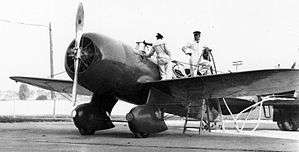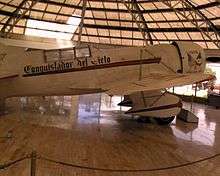Gee Bee Q.E.D.
| Gee Bee Q.E.D. | |
|---|---|
 | |
| The R-6H prepares for the MacRobertson Air Race | |
| Role | Air racing |
| National origin | United States of America |
| Manufacturer | Granville Brothers Aircraft, Granville, Miller & De Lackner |
| Designer | Zanford Granville, Pete Miller, Don Delackner |
| Introduction | 1934 |
| Status | under restoration |
| Number built | 1 |
| Developed from | Gee Bee R-5 |
The Gee Bee Q.E.D. ("Quod Erat Demonstrandum"), aka Gee Bee R-6H, aka the "Conquistador del Cielo" (Sky Conqueror) was the last in a series of racing and touring aircraft from the Granville Brothers. Unlike the other famous Gee Bee aircraft, the Q.E.D had the distinction of never finishing a race it was entered in.[1]
Development
The Gee Bee Q.E.D. was started by the Granville Brothers in 1933 prior to their October bankruptcy. On 11 February 1934, "Grannie Granville" died in Spartanburg, South Carolina delivering a Sportster E used to finance a new company based in New York and called Granville, Miller & De Lackner. The R-6H (Q.E.D.) was completed later in 1934 for customer Floyd B. Odlum, with Jacqueline Cochran chosen as the pilot.[2] The touring aircraft was designed with large fuel tanks to compete in the MacRobertson Air Race from RAF Mildenhall in East Anglia to Flemington Racecourse, Melbourne. A Curtiss Conqueror was the specified engine, but a Pratt & Whitney Hornet was substituted to make the race delivery date.
Design
The Gee Bee Q.E.D. shares the same general shape as the Gee Bee R1 racer, but is nearly 10 ft (3.0 m) larger in span and length. The aircraft was powered by a 675 hp (503 kW) Pratt & Whitney R-1690 Hornet. The fuselage is steel tube with fabric covering. The wings used wooden spars and ribs with mahogany plywood covering. The aircraft was painted bright green with orange markings to match the sponsor "Lucky Strike" cigarettes.
Operational history
The Q.E.D. failed to complete races for a variety of reasons, including a rag in the exhaust manifold, and a problematic cowling that came loose on several occasions.
- 1934 Bendix Race - Pilot Lee Gehlbach drops out en route to the race at Des Moines, Iowa after the cowling hit the prop.
- 1934 MacRobertson Air Race - Jacqueline Cochran and Wesley Smith withdrew with malfunctioning flaps, after landing damage at Bucharest [3]
- 1935 Bendix Race -pilot Royal Leonard forced down with engine trouble at Wichita, Kansas
- 1936 Thompson Trophy race - pilot Lee Miles dropped out after 10 laps. The aircraft goes into storage at Tucson, Arizona.
- 1938 Bendix Race - The aircraft is repainted cream and flown by George Armisted [4]

- 1939 24 May, owner Francisco Sarabia set a new record for a non-stop flight from Mexico City to New York City in 10 hours and 47 minutes. He also set records for flights between Los Angeles to Mexico City, Mexico to Chetumal, Mexico to Mérida and Mexico to Guatemala.
- 1939 Pilot Francisco Sarabia was killed in the crash of the Q.E.D. at Bolling Airfield in Washington D.C. when a rag is ingested into the carburetor. Sariabia struck the center post in the cockpit when the aircraft went into the Potomac river, but the aircraft remained intact and was brought back to Mérida, Yucatán.[5] Sarabia was well regarded in Mexico, he was buried in the Panteón de Dolores.A Mexican postage stamp was issued in his honor in 2000, featuring a picture of Sarabia and the Q.E.D.[6]
In 1972, the Q.E.D. underwent full restoration in Mexico City,[7] and is on display at the Museo Francisco Sarabia, Ciudad Lerdo.
Variants

- Gee Bee Super Q.E.D. II
- A highly modified replica of the Gee Bee Q.E.D. was built by Jim Moss and assistants powered by a 1,425 hp (1,063 kW) Wright R-1820 Cyclone. The aircraft flew its first flight on 26 September 2013.[8][9][10]
Specifications (Gee Bee Q.E.D.)

Data from Sport Aviation
General characteristics
- Capacity: 2
- Length: 27 ft 3 in (8.31 m)
- Wingspan: 34 ft 3 in (10.44 m)
- Height: 9 ft 6 in (2.90 m)
- Empty weight: 3,144 lb (1,426 kg)
- Gross weight: 6,500 lb (2,948 kg)
- Fuel capacity: 480 U.S. gallons (1,800 L; 400 imp gal)
- Powerplant: 1 × Pratt & Whitney R-1690 Hornet Radial, 675 hp (503 kW)
Performance
- Maximum speed: 196 kn; 362 km/h (225 mph)
- Range: 2,086 nmi; 3,862 km (2,400 mi)
References
- ↑ Walter J. Boyne. Flying, an introduction to flight, airplanes, and aviation careers.
- ↑ Don Vorderman. The great air races.
- ↑ David Shayler, Ian A. Moule. Women in space: -- following Valentina.
- ↑ Sport aviation, Volume 45; Experimental Aircraft Association International Inc.
- ↑ Walter J. Boyne. The best of Wings magazine.
- ↑ "Filatelia De Mexico". Archived from the original on 25 March 2012. Retrieved 15 June 2011.
- ↑ Skyways. April 2006. Missing or empty
|title=(help) - ↑ "Jim Moss's Gee Bee Q.E.D. Makes Maiden Flight". Archived from the original on 4 October 2013. Retrieved 4 October 2013.
- ↑ Sport Aviation. June 2011. Missing or empty
|title=(help) - ↑ "The Last Gee Bee". Sport Aviation: 53. April 2014.
External links
| Wikimedia Commons has media related to Gee Bee Q.E.D.. |